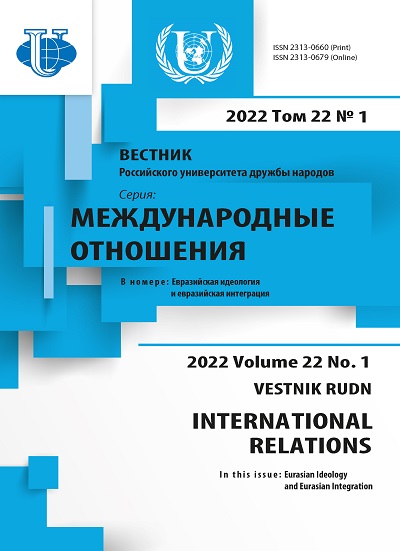Eurasianism as a Non-Western Episteme for Russian Humanities: Interview with Alexander G. Dugin, Dr. of Sc. (Political Sciences, Social Sciences), Professor, Leader of the International Eurasian Movement. Interviewed by M.A. Barannik
- 作者: Dugin A.G.1
-
隶属关系:
- International Eurasian Movement
- 期: 卷 22, 编号 1 (2022): Eurasian Ideology and Eurasian Integration
- 页面: 142-152
- 栏目: 学派
- URL: https://journals.rudn.ru/international-relations/article/view/30684
- DOI: https://doi.org/10.22363/2313-0660-2022-22-1-142-152
如何引用文章
详细
Alexander Gelyevich Dugin is a Soviet and Russian philosopher, political scientist, sociologist, theorist, PhD in philosophy, Dr. of Sc. (Political Sciences, Social Sciences), professor, leader of the International Eurasian Movement. He is Professor Emeritus at Eurasian National University named after L.N. Gumilev and Tehran University, visiting Professor at Southern Federal University, Senior Research Fellow at Fudan University (Shanghai). Alexander G. Dugin is the author of a number of journalistic publications, as well as scientific articles and textbooks on geopolitics and international relations, theory of a multipolar world. He has served as editor-in-chief of the “EON” publishing center, “Dear Angel” publishing house, and the journal “Elements.” Since 1991, he has been the Chairman of the historical-religious Association “Arktogeya.” From 1997 to 1999, he was the author and host of the program “Geopolitical Review” (Radio Free Russia). In 1998-2003, an advisor to the Chairman of the Russian State Duma. Since 2001, Chairman of the Political Council (leader) of the All-Russian Socio-Political Movement “Eurasia.” In 2008 to 2014, Professor, Head of the Department of Sociology of International Relations, Director of the Center for Conservative Research at the Faculty of Sociology at Moscow State University named after M.V. Lomonosov. In 2016-2017, editor-in-chief of “Tsargrad” TV channel. In his interview, Alexander G. Dugin discusses the concept of Eurasianism, its main schools, directions and representatives. Particular attention is paid to the influence of Eurasianism on Russia’s foreign policy and the strategic partnership between Russia and China. The interview deals with the specifics of Eurasian studies in Kazakhstan and Turkey. The leader of the International Eurasian Movement emphasizes that multipolarity is accompanied by the presence of both external and internal poles.
参考
- Bazavluk, S. V. (2018). Eurasianism: Terminological ambivalence. Vestnik RUDN. International Relations, 18(2), 273-283. (In Russian). https://doi.org/10.22363/2313-0660-2018-18-2-273-283
- Bromberg, Ya. A. (2002). Jews and Eurasia. Moscow: Agraf publ. (In Russian).
- Dugin, A. G. (2002). Fundamentals of Eurasianism. Moscow: Arktogeya-Tsentr publ. (In Russian).
- Dugin, A. G. (2009). Fourth political theory. Russia and political ideas of the 21st century. St. Petersburg: Amfora publ. (In Russian).
- Dugin, A. G. (2011). Geopolitics. Moscow: Akademicheskii proekt publ. (In Russian).
- Dugin, A. G. (2013). Theory of a multipolar world. Moscow: Evraziiskoe dvizhenie publ. (In Russian).
- Eurasian Regionalism as a Research Agenda. Interview with Dr. Mikhail A. Molchanov, University of Salamanca, Spain. (2020). Vestnik RUDN. International Relations, 20(3), 560-573. https://doi.org/10.22363/2313-0660-2020-20-3-560-573
- Glazyev, S. Y. (2018). Science on service of the Eurasian integration. Eurasian Integration: Economics, Law, Politics, (2), 10-11. (In Russian).
- Gumilev, L. N. (1993). Rhythms of Eurasia: Epochs and civilizations. Moscow: AST publ. (In Russian).
- Jacobson, R. O. (1931). On the characteristics of the Eurasian linguistic union. Prague: Izdanie evraziitsev publ. (In Russian).
- Leontiev, K. N. (2010). Byzantism and Slavism. Moscow: Izd-vo Sretenskogo monastyrya publ. (In Russian).
- Maçães, B. (2018). The dawn of Eurasia: On the trail of the new world order. London: Allen Lane.
- Mackinder, H. J. (1904). The geographical pivot of history. The Geographical Journal, 23(04), 421-437.
- Mahan, A. T. (2002). The influence of sea power on the history of 1660-1783. St. Petersburg: Terra Fantastica publ. (In Russian).
- Panarin, A. S. (1995). Russia in the civilizational process. Moscow: IFRAN publ. (In Russian).
- Trubetskoy, N. S. (2014a). Europe and Eurasia. Moscow: Algoritm publ. (In Russian).
- Trubetskoy, N. S. (2014b). Pan-Eurasian nationalism. In Russian Abroad: History and Modernity (Iss. 3, pp. 198-206). Moscow: INION publ. (In Russian).
补充文件
没有额外的文件显示








